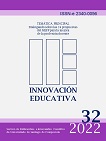Covid-19 and university distance learning in Spain. The practical case of journalism and communication degrees
Main Article Content
Abstract
The coronavirus crisis modified work routines in all professional fields, including university education with the temporary closure of academic buildings. Spanish universities continued to function despite the restriction of movement (State of Alarm Decree of 14 March 2020) as the teaching staff modified their routines by adjusting their theoretical and practical teaching procedures to the requirements of non-classroom teaching.
This article is an approach to the perceptions and experience of university lecturers during the pandemic and the post-pandemic stage. Methodologically, it compares the case study previously carried out in the Faculty of Social Sciences and Communication of Pontevedra (Gómez López and Alende Castro, 2022) with the findings of the present publication provided by lecturers from the universities of Navarra, Pontificia de Salamanca, Complutense de Madrid, Salamanca, Pompeu Fabra, La Laguna, Santiago de Compostela and A Coruña. The study involves a mixed methodology, with data collected from a standard questionnaire and an interview.
The results show that the efforts made by Spanish teachers and higher education centres made up for the limitations of the physical classroom during the pandemic but transferred to the virtual classroom the resources of the face-to-face methodology. However, no significant progress was made in new teaching methodologies that would allow progress to be made towards more flexible educational models.
Keywords:
Article Details
References
Alejo, M. y Osorio, B. (2016). El informante como persona clave en la investigación cualitativa. Revista Gaceta de Pedagogía, (35), pp. 74-85.
Amhag, L., Hellström, L. y Stigmar, M. (2019). Teacher educators' use of digital tools and needs for digital competence in higher education. Journal of Digital Learning in Teacher Education, 35(4), pp. 203-220. https://doi.org/10.1080/21532974.2019.1646169
Ander-Egg, E. (1995) Técnicas de investigación social. Editorial Lumen 24ª edición.
Arias, F. G. (2012). El proyecto de investigación. Introducción a la metodología científica. Editorial Episteme.
Asenjo Gómez, J. T. y Asenjo Gómez, F. (2021). La autopercepción de la competencia digital en los docentes: variaciones tras el confinamiento. Revista Española De Educación Comparada, (38), pp. 174–189. https://doi.org/10.5944/reec.38.2021.29032
Berelson, B. (1971). Content analysis in communication research. Harper.
Cortés Rojas, J. L. (2021). El estrés docente en tiempos de pandemia. Revista Dilemas contemporáneos: Educación, Política y Valores, 8 (Ed. Especial). https://doi.org/10.46377/dilemas.v8i.2560
García Martín, J. y García Martín, S. (2021). Uso de herramientas digitales para la docencia en España durante la pandemia COVID-19. Revista Española De Educación Comparada, (38), pp. 151–173. https://doi.org/10.5944/reec.38.2021.27816
García-Planas, M. I. y Taberna Torres, J. (2020). La transición de la docencia presencial a no presencial en la UPC durante a pandemia da COVID-19. IJERI: International Journal of Educational Research and Innovation, (15), pp. 177–187. https://doi.org/10.46661/ijeri.5015
Gay, L. R., Mills, F. E. y Airasian, P. (1996). Educational Research. Competencies for Analysis and Application. Merril.
Gómez López, C. y Alende Castro, S. (2022). Rutinas y tareas del profesorado universitario durante la COVID-19. Estudio de caso de la Facultad de Ciencias Sociales y Comunicación de la Universidad de Vigo. Revista Investigación. Cultura, Ciencia y Tecnología, 27(14), pp. 36-48.
Hodges, Ch., Moore, S., Lockee, B., Trust, T. y Bond, A. (2020). The Difference Between Emergency Remote Teaching and Online Learning. Educase Review. https://cutt.ly/nyjLfIH
Instefjord, E. y Munthe, E. (2016). Preparing pre-service teachers to integrate technology: an analysis of the emphasis on digital competence in teacher education curricula. European Journal of Teacher Education, 39(1), pp. 77-93. https://doi.org/10.1080/02619768.2015.1100602
López-Golán, M., Costa-Sánchez, C. y Puentes-Rivera, I. (2022). Educación superior en comunicación audiovisual desafíos de la virtualidad en tiempos de COVID-19. Revista Internacional de Investigación en Comunicación, (27), pp. 112-128. https://doi.org/10.7263/adresic-27-197
Mishra, L., Gupta, T. y Shree, A. (2020). Online teaching-learning in higher education during lockdown period of COVID-19 pandemic. International Journal of Educational Research Open, 1, p. 100012. https://doi.org/10.1016/J.IJEDRO.2020.100012
Monistrol, O. (2007). El trabajo de campo en investigación cualitativa. Revista Nure Investigación, (29), pp. 1-4.
Nieto, E. (2018). Tipos de investigación. Repositorio institucional de la Universidad Santo Domingo de Guzmán. Recuperado de http://repositorio.usdg.edu.pe/handle/USDG/34
Quezada, R. L., Talbot, C. y Quezada-Parker, K. B. (2020). From bricks and mortar to remote teaching: a teacher education programme‘s response to COVID-19. Journal of Education for Teaching, 46(4), pp. 1–12. https://doi.org/10.1080/02607476.2020.1801330
Ramírez-Montoya, M. S., Mena, J. y Rodríguez-Arroyo, J. A. (2017). In-service teachers’ self-perceptions of digital competence and OER use as determined by a MOOC training course. Revista Computers in Human Behavior, (77), pp. 356-364. https://doi.org/10.1016/j.chb.2017.09.010
Redecker, C. (2017). European framework for the digital competence of educators: DigCompEdu, (Y. Punie, editor). European Commission, Joint Research Centre, Publications Office. https://data.europa.eu/doi/10.2760/159770
Reisoğlu, İ. y Çebi, A. (2020). How can the digital competences of pre-service teachers be developed? Examining a case study through the lens of DigComp and DigCompEdu. Computers & Education, 156, p. 103940. https://doi.org/10.1016/j.compedu.2020.103940
Robledo Martín, J. (2009). Observación participante: Informantes claves y rol del investigador. Revista Nure Investigación, (42), pp. 1-4.
Sánchez Silva, M. (2005). La metodología en la investigación cualitativa (Artículos y Miscelánea). Mundo Siglo XXI. Revista del Centro de Investigaciones Económicas, Administrativas y Sociales del Instituto Politécnico Nacional, (1), pp. 115-118.
Selltiz, C. et al. (1965). Research Methods in Social Relations. Society for the Psychological Study of Social Issues. Holt, Rinehart and Winston.
Vargas-D'Uniam, J., Lucrecia Chumpitaz-Campos, L, Guadalupe Suárez-Díaz, G y Antoni Badia, A. (2014). Relación entre las competencias digitales de docentes de educación básica y el uso educativo de las tecnologías en las aulas. Profesorado, Revista de curriculum y formación del profesorado, 18(3), pp. 361-377. http://hdl.handle.net/10481/34544
Vergés, J. M. (2022). Enseñanza-aprendizaje virtual en el ámbito universitario en tiempos de pandemia: estudio de caso de la Universidade de Vigo (UVigo), en España. Consolidación y Estructuración de unidades de investigación competitivas del Sistema Universitario de Galicia. Ayuda para grupos de referencia competitiva (GRC). Recuperado de https://www.researchgate.net/publication/358022225_Ensenanza-aprendizaje_virtual_en_el_ambito_universitario_en_tiempos_de_pandemia_estudio_de_caso_de_la_Universidade_de_Vigo_UVigo_en_Espana
Vilches, L. (2011). La investigación en comunicación. Métodos y técnicas en la era digital. Gedisa.
Williamson, B. y Hogan, A. (2020). La comercialización y la privatización en y de la educación en el contexto de la COVID-19. Bruselas: Internacional de la Educación. Recuperado de https://observatorioeducacion.org/sites/







